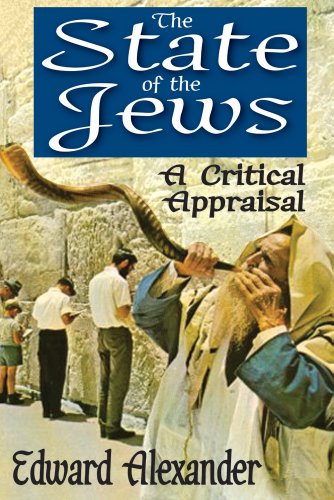Since anti-Zionism, which has taken on the characteristics of anti-Semitism, has become increasingly acceptable as an expression of “genuine” criticism of Israel within academic circles, even Jewish professors, Edward Alexander’s latest book, The State of the Jews: A Critical Appraisal, is both relevant and timely. In his previous book, The Jewish Divide over Israel Accusers and Defenders, Alexander cogently describes this problem, as follows:
“Jews who assign responsibility for anti-Jewish aggression to Jewish misbehavior not only save themselves from the unpleasant and often dangerous task of coming to the defense of Jews under attack but also retain the charms of good conscience….”
Edward Alexander’s new study entitled The State of the Jews presents a collection of forceful essays and reviews spanning over a decade and focuses upon the Jewish contribution to the war of ideas against the Israel and the Jewish people.
Alexander expresses scornful contempt for academic anti-Semitism and the collaboration of Jewish liberals in the demonization of Israel. This phenomenon, known as the “Auschwitz syndrome,” represents the idea that Zionism is in fact the new Nazism. By evoking Auschwitz, Israel’s Jewish and Gentile defamers, apply a double standard with regard to Israel and its supporters. Using this method, they play down the territorial dispute in the Middle East and stigmatize Israel’s government and army as committing actions which mark them as the heirs of Nazism.
Pro-Palestinian sympathizers, whose ranks include some prominent Jews, have used and abused the collective memory of the Holocaust. They have broken Cynthia Ozick’s cardinal rule that, “Jews are not metaphors – not for poets, not for novelists, not for theologians, not for murderers, and never for anti-Semites…” They have defined the Holocaust down by labeling those who raise the issue as “Holocaust-consumed”. For example, if one evokes historical precedents by comparing the present with the 1930’s, he or she is accused of what Peter Beinart describes as “hoarding the Holocaust.” Thus, calling someone “Holocaust-consumed” has become a new form of Holocaust denial. Of course, it does not mean denying that the Holocaust took place; it simply strips the Holocaust of any historical relevance in the world of today.
Alexander ably demonstrates how many Jews have adopted pro-Palestinian, anti-Zionist views in order to promote themselves by displaying their “globalism” or “enlightenment” and proving that they care more about the world at large than their Jewish identity.
Alexander’s arguments are particularly applicable in academe, where politicized writing and teaching have displaced scholarship, as they did in Nazi Germany. Furthermore, academic freedom has been redefined as the liberty to dispense with academic standards. Hence, the common practice of hiring token Israeli Jews on campus who champion anti-Israel positions. This gives an illusion of balance and stifles debate. Moreover, these Israeli academics have built their reputations upon bogus scholarship which not only is harshly critical of Israel’s policies, but of the very existence of the State of Israel. As a result, these anti-Israel scholars of Israeli background are a valuable asset to many pro-Palestinian groups.
Finally, Edward Alexander’s study is crucial to our understanding of the implications of the increasingly popular Boycott, Divestment and Sanctions (BDS) movement. Many Jews, including naive community leaders, are willing to participate in discussions with BDS advocates and others who question Israel’s legitimacy as a Jewish state. They do so under the guise of academic freedom, which conveys the impression of legitimate criticism rather than an expression of anti-Jewish racism.
A seasoned scholar and excellent writer, Edward Alexander has always dealt with major issues of culture and politics. The State of the Jews: A Critical Appraisal vividly describes the complex battlefield associated with war of ideas on campus and with Jewish continuity. The book demonstrates why a solid understanding of history is essential. It should be required reading for students, faculty, rabbis, community leaders and political figures.



